Frost/Nixon
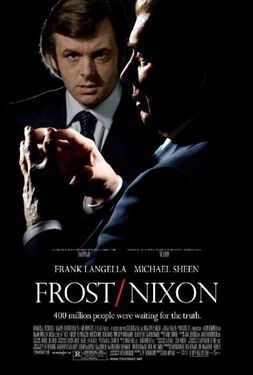
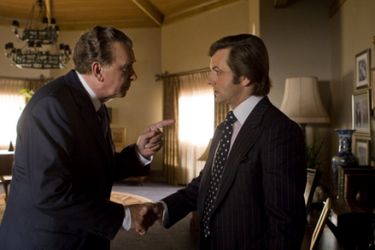 Now that I have seen the film adaptation of the play (where Langella is once again re-teamed with his Broadway co-star, Michael Sheen, in the role of David Frost), I admire his performance even more. While I tend to find live theater to be a more intimate connection between the actors and the audience, we can technically get closer to the actors on the big screen. We can study their face, and watch their performance up close. That's just what I did watching Langella's portrayal of Nixon, and he absolutely stunned me. In Peter Morgan's screenplay (he also wrote the play), Nixon is not portrayed as a villain, or even as a sympathetic character that we are to pity. We see him as...well, being human. A man who fell from grace, and is struggling to pick himself back up. Yes, he is reluctant to admit his own guilt in the matter that caused his downfall in the first place. That happens sometimes when you're human. Langella is able to embody all of this just in his performance alone. His tight face, his pressed lips, the way he is always trying to spin what he says...We get the sense that if there was anyone who bought into the legacy and promise of Nixon, only to be let down by his actions in Watergate, it is Nixon himself.
Now that I have seen the film adaptation of the play (where Langella is once again re-teamed with his Broadway co-star, Michael Sheen, in the role of David Frost), I admire his performance even more. While I tend to find live theater to be a more intimate connection between the actors and the audience, we can technically get closer to the actors on the big screen. We can study their face, and watch their performance up close. That's just what I did watching Langella's portrayal of Nixon, and he absolutely stunned me. In Peter Morgan's screenplay (he also wrote the play), Nixon is not portrayed as a villain, or even as a sympathetic character that we are to pity. We see him as...well, being human. A man who fell from grace, and is struggling to pick himself back up. Yes, he is reluctant to admit his own guilt in the matter that caused his downfall in the first place. That happens sometimes when you're human. Langella is able to embody all of this just in his performance alone. His tight face, his pressed lips, the way he is always trying to spin what he says...We get the sense that if there was anyone who bought into the legacy and promise of Nixon, only to be let down by his actions in Watergate, it is Nixon himself.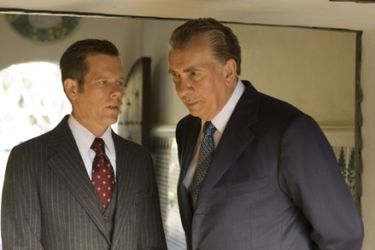 It's a great performance, one that I loved even more being able to see up close. Fortunately, Frost/Nixon is a great movie to go along with it. Sometimes when the original stage talent tries to recreate their roles on the big screen, the thing that made the performance special on the stage is not there. (I am reminded of 2005's The Producers musical movie, which while enjoyable, lacked the energy that I saw on Broadway.) Director Ron Howard has managed to make the transition to the screen here work. He manages to stay faithful to the original ideas of the production, while not making it seem like a direct copy of the stage play. He does this by filming the story as a pseudo documentary, occasionally cutting away from the story for one on one "interviews" with the actors in character discussing their personal thoughts. He has taken a number of dramatic liberties here with what really happened, but doesn't veer so off course from history that it starts to become a distraction. I also greatly admired the gritty and realistic look of the movie. It does not look like a glossy Hollywood production. The lighting is intentionally dark, but never murky or hard to see. Adding to the sense of realism is the subtle music score by Hans Zimmer, which is barely noticeable in most scenes. A more rousing and attention grabbing score would have come across as manipulative, or felt like it was telling us how to feel during a scene. Howard and Zimmer let the actors and the dialogue itself do the talking.
It's a great performance, one that I loved even more being able to see up close. Fortunately, Frost/Nixon is a great movie to go along with it. Sometimes when the original stage talent tries to recreate their roles on the big screen, the thing that made the performance special on the stage is not there. (I am reminded of 2005's The Producers musical movie, which while enjoyable, lacked the energy that I saw on Broadway.) Director Ron Howard has managed to make the transition to the screen here work. He manages to stay faithful to the original ideas of the production, while not making it seem like a direct copy of the stage play. He does this by filming the story as a pseudo documentary, occasionally cutting away from the story for one on one "interviews" with the actors in character discussing their personal thoughts. He has taken a number of dramatic liberties here with what really happened, but doesn't veer so off course from history that it starts to become a distraction. I also greatly admired the gritty and realistic look of the movie. It does not look like a glossy Hollywood production. The lighting is intentionally dark, but never murky or hard to see. Adding to the sense of realism is the subtle music score by Hans Zimmer, which is barely noticeable in most scenes. A more rousing and attention grabbing score would have come across as manipulative, or felt like it was telling us how to feel during a scene. Howard and Zimmer let the actors and the dialogue itself do the talking.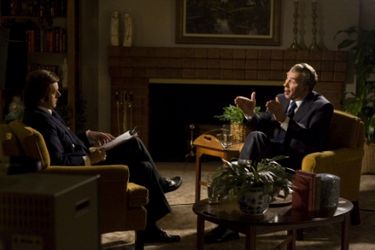 The film, just like the play, is a David and Goliath story as the two title characters struggle for control during a series of interviews. As it opens, Nixon has gone into exile in California after being pardoned by his successor in office, Gerald Ford. When British talk show host, David Frost, approaches him with the idea for the interviews, it seems like an immediate long shot. Frost is depicted here as a playboy, best known for his fluff pieces dealing with celebrities. That's why one of Nixon's main supporters and followers, Jack Brennan (Kevin Bacon), was so willing to talk the disgraced President into doing the interviews. Frost would most likely be throwing softball questions, and it'd be a chance for Nixon to tell his side of the story to the American public. The first half of the film deals with Frost's struggles to gather the $600,000 he agreed to pay for the interview, his problems finding a sponsor (the networks weren't crazy about the idea of a British talk show host who was popular overseas, but largely unheard of in the U.S., interviewing an American President), and assembling his investigative team to prepare for the interview, which includes John Burt (Matthew McFadyen), Bob Zelnick (Oliver Platt), and James Reston Jr (Sam Rockwell). Some, like John Burt, assisted Frost out of loyalty, while others like Reston saw it as a chance to give Nixon the trial he never had.
The film, just like the play, is a David and Goliath story as the two title characters struggle for control during a series of interviews. As it opens, Nixon has gone into exile in California after being pardoned by his successor in office, Gerald Ford. When British talk show host, David Frost, approaches him with the idea for the interviews, it seems like an immediate long shot. Frost is depicted here as a playboy, best known for his fluff pieces dealing with celebrities. That's why one of Nixon's main supporters and followers, Jack Brennan (Kevin Bacon), was so willing to talk the disgraced President into doing the interviews. Frost would most likely be throwing softball questions, and it'd be a chance for Nixon to tell his side of the story to the American public. The first half of the film deals with Frost's struggles to gather the $600,000 he agreed to pay for the interview, his problems finding a sponsor (the networks weren't crazy about the idea of a British talk show host who was popular overseas, but largely unheard of in the U.S., interviewing an American President), and assembling his investigative team to prepare for the interview, which includes John Burt (Matthew McFadyen), Bob Zelnick (Oliver Platt), and James Reston Jr (Sam Rockwell). Some, like John Burt, assisted Frost out of loyalty, while others like Reston saw it as a chance to give Nixon the trial he never had.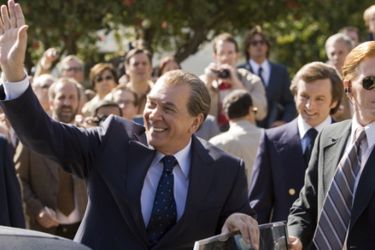 The second half deals with the interviews themselves, which covered a span of four days and numerous hours. The movie picks and chooses carefully here, selecting key moments from the famous interviews to best aid the drama. Obviously, a great deal has been cut, but the screenplay chooses which moments to focus on well. (Besides, purists can buy the actual interviews on DVD if they want the whole thing.) This is when we truly get to see the mastery of not just Langella's portrayal of Nixon, but also Michael Sheen's turn as Frost. Langella's turn is obviously the more dramatic and attention grabbing, but Sheen does a fantastic job of portraying with his face what Frost had to have been thinking as he was sitting across from Nixon. During the early interviews, Nixon tries to bend the proceedings to his favor. Whenever Frost asks a tough question, he replies with a drawn out answer as he rambles and reminisces about his memories in the Oval Office. We can see in Sheen's face during these moments the feeling that he is in over his head. He knows what Nixon is doing, but did not prepare himself for this. He comes across as being nervous, while Nixon comes across as the comfortable and collected one.
The second half deals with the interviews themselves, which covered a span of four days and numerous hours. The movie picks and chooses carefully here, selecting key moments from the famous interviews to best aid the drama. Obviously, a great deal has been cut, but the screenplay chooses which moments to focus on well. (Besides, purists can buy the actual interviews on DVD if they want the whole thing.) This is when we truly get to see the mastery of not just Langella's portrayal of Nixon, but also Michael Sheen's turn as Frost. Langella's turn is obviously the more dramatic and attention grabbing, but Sheen does a fantastic job of portraying with his face what Frost had to have been thinking as he was sitting across from Nixon. During the early interviews, Nixon tries to bend the proceedings to his favor. Whenever Frost asks a tough question, he replies with a drawn out answer as he rambles and reminisces about his memories in the Oval Office. We can see in Sheen's face during these moments the feeling that he is in over his head. He knows what Nixon is doing, but did not prepare himself for this. He comes across as being nervous, while Nixon comes across as the comfortable and collected one.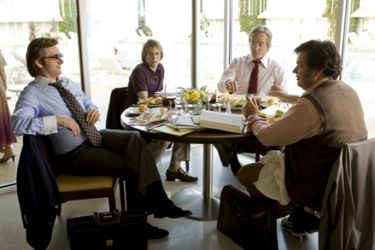 When the tide of the interviews begins to change, and Frost becomes more willing to press Nixon during the interviews, we get to truly appreciate both of their performances. Sheen becomes more confident, while we see Langella struggling to hold onto the control he once had, and when he realizes he doesn't have it anymore, he seems to keep on trying to convince himself that he does. The close ups and tight camera angles bring us up close to the actors, and they both give performances that would have stated the same thing even if they didn't have any dialogue. While Langella gets the most praise and an Oscar nomination for his performance (a well-earned one, I might add), it was Sheen that particularly grabbed me, because having seen him in Underworld: Rise of the Lycans the weekend before, I couldn't believe I was looking at the same person. While both that film and this are of widely differing levels of quality, they both showcase his ability to completely disappear into a role. And while it's hard to compete with such powerful performances at the center, this is a wonderful ensemble cast, with Sam Rockwell and Kevin Bacon being particular stand outs.
When the tide of the interviews begins to change, and Frost becomes more willing to press Nixon during the interviews, we get to truly appreciate both of their performances. Sheen becomes more confident, while we see Langella struggling to hold onto the control he once had, and when he realizes he doesn't have it anymore, he seems to keep on trying to convince himself that he does. The close ups and tight camera angles bring us up close to the actors, and they both give performances that would have stated the same thing even if they didn't have any dialogue. While Langella gets the most praise and an Oscar nomination for his performance (a well-earned one, I might add), it was Sheen that particularly grabbed me, because having seen him in Underworld: Rise of the Lycans the weekend before, I couldn't believe I was looking at the same person. While both that film and this are of widely differing levels of quality, they both showcase his ability to completely disappear into a role. And while it's hard to compete with such powerful performances at the center, this is a wonderful ensemble cast, with Sam Rockwell and Kevin Bacon being particular stand outs.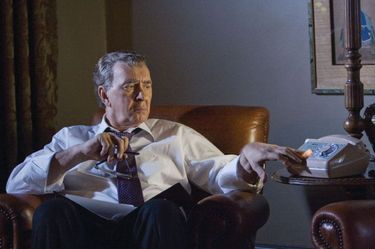
ONE FINAL NOTE: Frost/Nixon has been rated R for language, although it is minimal, and nothing a parent with a teen would have to be concerned about. When you consider a movie like Taken gets a PG-13 while featuring non-stop violence, depictions of torture, and a scene where the hero shoots an innocent woman in order to get her husband to talk, you sometimes have to wonder what the ratings board is thinking. If I were the parent of a teen, I'd feel much safer (and happier) letting them watch Frost/Nixon.
See the movie times in your area or buy the DVD at Amazon.com!






0 Comments:
Post a Comment
<< Home